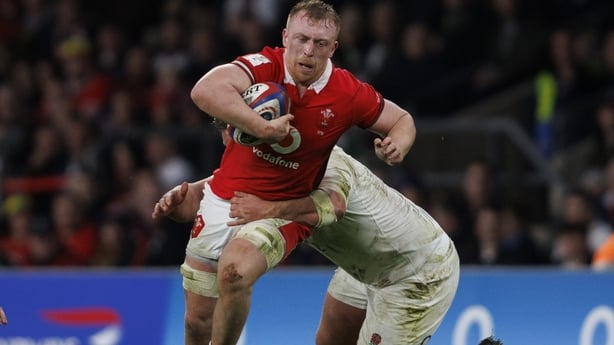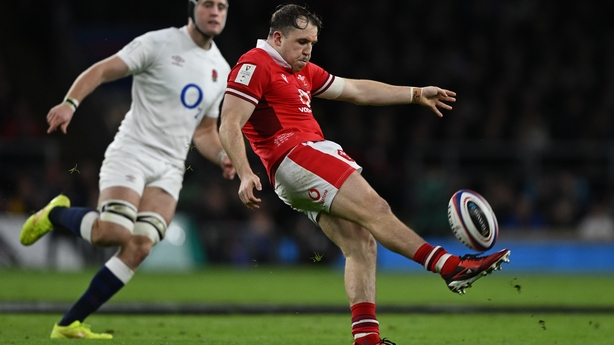Ireland and Wales will face off this weekend as the Guinness Six Nations returns.
Wales remain winless after failing to put full performances together against Scotland and England, and despite signs that their rebuild is well underway, it will take a Gatland miracle for them to get one over on Ireland at the Aviva on Saturday.
If Wales are going to stop the cohesion of Ireland's performances, they’ll have to start with some of the basics.
The Irish lineout struggled in the World Cup, and has obviously been a main area of focus for them as a group. They’ve turned their effectiveness around massively, which is unsurprising with Paul O’Connell in control there. Ireland have won 26 of their 26 lineouts in the competition so far.
Wales need to make life a lot harder for the Irish hookers and get the likes of Adam Beard in to disrupt the Irish attacking rhythm. South Africa had a good go at taking this source away from Ireland in the World Cup. If you break down some areas where Wales could get some parity, this is one of the key parts of the game where they could create some doubt in the Irish gameplan.
Disrupting their setpiece, or at least dictating where Ireland can win clean ball, would have an impact on the launch plays that Ireland use. I believe Ireland will have enough ammunition to overcome that potential disruption, seeing as they had to plan without a highly successful lineout for the World Cup. However, any attack that has to win the ball at the front of the lineout will be less effective than freely winning the ball wherever they want.
Ireland often play off short lineouts to take defensive jumpers out of the opposition set up. It allows less of a challenge in the air and it also gives Ireland more numbers in their attack for intricate midfield plays.
If Wales can do a job on this source of possession, they can also double down on the ruck speed that Ireland like to play off.
Ireland have the fastest ruck speed in the competition for quite some time, and slowing that down is a crucial area of the game for Wales to go after. If you give Ireland quick ball, they will have their way with you in attack. It will be waves of connected options at the tackle line with many decisions being made by attackers playing with more time.
If you can take away that quick possession, the Welsh defence won’t be chasing shadows. Instead, they could set up with better spacings and numbers, while having a chance to look up at any potential sequences that come their way, resulting in better defensive decisions.

How will they slow down the Irish attack? Tommy Reffell. He’s a key player for Gatland at the moment, and the right man to get stuck into the Irish breakdown. If the defence can put Ireland under pressure, Reffell will get some turnovers. If he can disrupt the Irish attack, they’ll need more numbers to resource the breakdown.
We saw against South Africa at the World Cup that if you disrupt their rhythm and flow of that attack by forcing Ireland to resource breakdowns with players that want to stay out in attack, their options at the line become less potent.
It’s very easily said and more difficult to do, but if Reffell is going to get any joy, he’ll need some help in forcing those turnovers. Jenkins clung on to a poach last week against England in the second half, for just enough time to force a stray ball at the breakdown and Reffell was on hand to mop it up. Wales will need many of those wins to stop the Irish entries into their half.
Where Wales need to be better is in their kicking game. They failed to exit on a few occasions against England, even when the opportunity to do so was clear cut. England scored off the back of a scrum when Ben Earls crashed through a few defenders to touch down, leading to the gaffed conversion by George Ford.
However, had Ioan Lloyd kicked the ball out of his own half, England wouldn’t have been in that position in the first place. Of course, it’s all part of the learning curve as an out-half, but Ireland will punish Wales if they are poor with their kicking game again.
England were also allowed to claw back to a one score game in the second half when a straight-forward Welsh exit was pinged for the chasers being offside. An easy three points for England through George Ford gave them a platform to get back into the game.
Ireland have been treating their counter-attack like another setpiece and a very important part of their attacking platform. Wales don’t need to give them more ammo.
Hugo Keenan looks set to miss the game, if Ciaran Frawley’s lack of availability for Leinster is anything to go by. Keenan is one of those highly-rated players that is still somehow underrated. His ability to cover ground in the back field in both defence and attack will leave a hole in Ireland’s structure. Frawley is a great footballer and plays to his own strengths, but Keenan makes up a lot of ground to paper over the cracks left by others at times.

Wales have a very clever attacking kicking game too. Ireland have always been a bit vulnerable if the opposition can execute with their attacking kicks. Lloyd had a beautiful crossfield kick in the second half against England and Tomos Williams is more than capable of pulling off some magic over the top of the defence. This is an area that Wales need to go after, which will be made easier if Keenan doesn’t make the team.
With all that said, it will still come down to the nuts and bolts of the game. If Wales don’t stop Bundee Aki on the gainline then they will be chasing Ireland around the pitch all day. Aki is in scintillating form and a complete handful in the middle of the pitch.
Despite Wales having serious gas and attacking threat in the back three, they fail to give the likes of Adams, Winnett and Dyer enough ball to cause issues.
Ireland are a high scoring team. Even if Wales go after their lineout and breakdown, Ireland will still have the ability to put up a score, and if Wales want to compete away from home, they’ll have to build a realistic score that will win a game. Ireland regularly score 30-plus points at the Aviva, and while the plan will be to curtail that, Wales will need to move the ball a bit more freely to do some scoring of their own to be in with a chance.
While murmurs of Grand Slams will ring around Dublin, Ireland will have to dispatch Wales with early dominance before they can focus on their biggest challenge in this tournament: England at Twickenham.
Watch Ireland v Wales in the Guinness Six Nations on Saturday from 1.30pm on RTÉ2 and RTÉ Player, follow a live blog on rte.ie/sport and the RTÉ News app and listen to live commentary on RTÉ Radio 1


